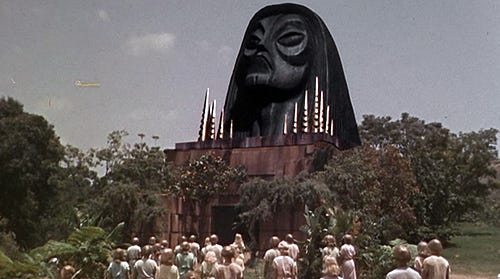How 'The Time Machine' explains the future of knowledge work
Maybe AI eventually lets us escape Earth and live forever, but in the near-term it will create two tiers of knowledge-economy worker
The Time Machine is one of my personal favorite 1960s-era films. Based on the H.G. Wells novel, a Victorian-era inventor (Rod Taylor) gets transported to the year 802,701 A.D. by a time travel device he constructed. Here, he meets the Eloi, a future evolution of humans that look like they just came from an overpriced brunch in The Marina. But deep underground also dwell the Morlocks: hairy, gritty humanoids who are nonetheless active, enterprising and clever enough to have turned the Eloi into a free-range food source (they decided not to eat the bugs). You should read the book or at least watch the original movie if you haven’t.
I was reading more AI narratives this weekend (because this is still the topic du jour, and probably will be forever now) and one idea came to mind I don’t think enough people have considered. There’s a scenario where AI creates two tiers of knowledge economy workers similar to the society portrayed in The Time Machine. The Eloi are represented by those who overly rely on AI, while the Morlocks are those who use AI sparingly, preferring to sweat details themselves and not become fatted and lazy. This narrative is the inverse of what some expect would happen, but I think it’s far more plausible even in the near-term. This is because we’ve conditioned not just the tech sector but much of the business world to merely be ‘first’ to things and made that their only real skill (if you can call it that). AI could mark the end of this race as a ‘final’ innovation in many areas. So they’ll now simply use AI to do everything.
At the top tier of the new AI-driven knowledge economy would stand the Eloi, those who use AI systems to perform virtually every task. These folk would indeed have a lifestyle of leisure and comfort, as AI handles everything from mundane chores to complex decision-making processes. They would likely include affluent professionals, executives, and entrepreneurs who have outsourced their cognitive (and soon) physical labor to AI-enabled apps and devices. In this world, the Eloi are characterized by their detachment from all manual work and a preference for instant gratification, akin to the passive existence of their literary counterparts. Unfortunately in real life, the thinking ones would eventually end up nihilistic, depressed and unhappy, for they do not know why they are here other than ‘to optimize.'
In contrast, the Morlocks represent a different breed of knowledge workers who embrace AI sparingly, know when to use it to replace uncreative/repetitive tasks and as a tool rather than a crutch. They recognize the inherent limitations of AI systems and understand the value of human judgment, intuition, and creativity in complementing machine intelligence. They may include skilled craftsmen, artisans, and technicians who leverage AI to enhance productivity while still retaining a hands-on approach to work. They aren’t luddites, far from it: they use tools, but maintain humans are in the driver’s seat. Unlike the Eloi, the Morlocks are willing to invest the time and effort required to master a craft, preferring the satisfaction of something detail-oriented and to specific vision over the convenience of something fast but generic. You can mentally replace the “generative” in generative AI with generic by the way, and it honestly works better (totally fine for some things, but you have to know where).
Anyway, the division between the Eloi and the Morlocks presents a good mental model for what AI will do to people. I like this analogy better than the Wall-E or Idiocracy scenarios here because those wholesale assume everyone will be dumbed down, which seems unlikely. Enough humans who don’t want to live like that will persist. So while Eloi blindly prioritize speed as they want a life of leisure and time for political games, Morlocks value autonomy and mastery in chosen fields. This divergence will have profound implications for the future of work and with it society as a whole. Eloi mindset creates the 737 Max or infinite superhero sequels, Morlocks build the A320 and Oppenheimer (watch the making of if you haven’t). I mentioned the Eloi as being the ‘top tier,’ but that is just in appearance. The Morlocks are actually in control, but do not care about luxury appearances and so allow the Eloi to play dated status games and engage in decadence.
For companies inhabited by mostly Eloi, there is increasing risk of stagnation and complacency. With AI handling most tasks, there will be little incentive for anyone to develop new skills or follow meaningful pursuits beyond what AI can provide. Their teams must strictly follow rules (likely also created by machines) with little deviation, and no one will know enough or be empowered to do anything if something isn’t quite right.
Conversely, a team of Morlocks embody a spirit of resilience and adaptability in the face of change and challenge. They think strategically and about the wider metagame because they know there’s more to work than purely ‘speed’ and ‘more’ output without thought. Their team members are empowered to make frontline decisions and are not treated like cattle. Also, by viewing AI as just a tool rather than a god/replacement for human creativity, they ensure skills remain honed and valuable. While the path of the Morlock is more challenging and detail-oriented, it offers far greater personal fulfillment and professional satisfaction. Which one are you?




Long live the Morlock
What an interesting framework - I like it - although I don't understand why you think the advent of AI will create this division. Why didn't the information revolution up until now not create this already?